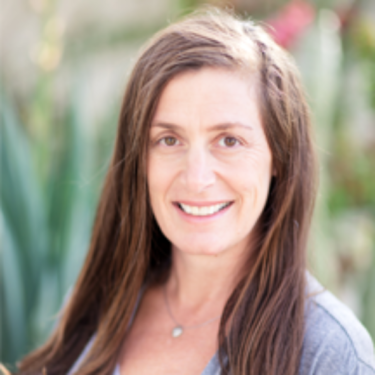CSPO People
Affiliated ASU Scholars
Leah Gerber
Founding Director, Center for Biodiversity Outcomes, Arizona State University

Biography
Leah Gerber is a professor of conservation science in the School of Life Sciences and founding director of the Center for Biodiversity Outcomes (CBO) at Arizona State University. Gerber’s research, teaching and leadership advance the integration of science in decision processes to achieve sustainable biodiversity outcomes.
A population ecologist and marine conservation biologist by training, Gerber received her PhD in wildlife ecology in 1998 from the University of Washington, where her doctoral work included the development of quantitative criteria for decision-making under the United States Endangered Species Act. Before joining Arizona State University as a professor in 2013, Gerber was a postdoctoral fellow at the National Center for Ecological Analysis and Synthesis in Santa Barbara, CA. She returned to Santa Barbara in 2005 as a distinguished visiting associate professor at UC Santa Barbara’s Bren School of Environmental Science and Management. In 2007, Gerber was recognized by ASU as an Exemplar Associate Professor. Most recently (2017-18), she was a Fulbright fellow at the Universidad San Francisco in Quito and the Galapagos Islands, Ecuador. Gerber is a Fellow of the Ecological Society of America and the Aldo Leopold Leadership Program.
As one of the world’s leading conservation scientists, Gerber frequently serves on globally significant bodies charting the future course of conservation. She served as lead author of the Global Assessment Report on Biodiversity and Ecosystem Services, an initiative of the United Nation’s Intergovernmental Science-Policy Platform on Biodiversity and Ecosystem Services. Gerber regularly provides guidance to international agencies and corporate bodies, including the International Whaling Commission, the UN World Conservation and Monitoring Center, and the World Business Council on Sustainable Development. Gerber has served on the Board of Governors for the Ecological Society of America, the Society for Conservation Biology, the Society for Marine Mammalogy. She currently serves on the International Union for Conservation of Nature Red List Committee and the Scientific Advisory Boards for Defenders of Wildlife and the Charles Darwin Foundation.
Gerber is passionately committed to communicating the relevance of science in tackling the complex environmental challenges of the 21st century. She communicates regularly with the media as an expert source on global change and biodiversity and has been interviewed by The Economist, POLITICO, Time, Reuters, Outside Magazine, Science, WIRED Science, National Geographic, Bloomberg, The Washington Post and ABC News. She also writes regularly for high-impact general audience platforms, including Nature, Pacific Standard, The Christian Science Monitor and The Conversation.
Since founding CBO in 2014, Gerber’s vision and strategic leadership have established CBO as a center of interdisciplinary academic excellence, where CBO’s faculty, partners and students are making key discoveries and creating solutions to mitigate biodiversity loss. CBO draws upon the interdisciplinary expertise of 150 faculty affiliates and partners with dozens of local, national and international organizations in the NGO, corporate, business and academic sectors to bring scientific knowledge into conservation action. Gerber is constantly pioneering new models of engagement as part of the NSF Science of Science and Innovation Policy program. For example, she works with the corporate sector in developing innovative methods of biodiversity conservation, such as conservation finance and corporate biodiversity accountability.
Gerber’s own research reveals new approaches to conservation planning and management, including in conservation priority setting, ecosystem-based management, adaptive monitoring and management, marine recreation, endangered species recovery plans, and estimating extinction risk. Her work draws on natural history, primary data collection, theories of behavioral ecology, quantitative demographic approaches and systems theory. She has published more than 150 peer-reviewed articles and book chapters, and frequently publishes in leading scientific journals such as Science, Nature, PNAS, American Scientist and Ecology Letters. Her research has garnered a broad base of funding, including a National Science Foundation CAREER Award and the Lenfest Ocean Program of the Pew Charitable Trusts.
Among the many impactful outcomes emerging from Gerber’s research-based collaborations, Gerber produced a practical handbook on how to demographic analysis in extinction risk estimates; a decision tool to examine consequences for resource allocation strategies on species protection; an evidence-based restoration program to recover the endangered white abalone; and ecosystem models that inform the global management of whales and fisheries.
As a teacher and mentor, Gerber focuses on training a new generation of conservation leaders. Her teaching portfolio includes environmental communication and leadership, marine conservation biology, quantitative methods in conservation and ecology and environmental modelling. Gerber recently established a new Graduate Certificate in Environmental Communication and Leadership at ASU to prepare and empower students to address the world’s increasingly complex sustainability challenges. Gerber has served as the primary advisor for 13 doctoral students and has been a committee member to 16 doctoral, 18 masters and 22 undergraduate students.
Gerber is a senior sustainability scientist in Arizona State University’s Julie Ann Wrigley Global Institute of Sustainability, a fellow in the Institute for the Future of Innovation in Society, an honors faculty in the Barrett Honors College, an affiliate faculty in Applied Mathematics for Social Sciences and an affiliate faculty in the School of Public Affairs.
Originally from the coast of California, Gerber enjoys hiking, yoga, traveling, gardening and spending time with her family.
No posts were found.